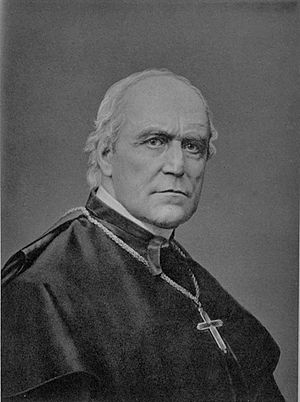Wilhelm Emmanuel von Ketteler facts for kids
Quick facts for kids The Right Reverend Wilhelm Emmanuel Freiherr von Ketteler |
|
|---|---|
| Bishop of Mainz | |
 |
|
| Church | Latin Church |
| Diocese | Mainz |
| Appointed | 20 May 1850 |
| Reign ended | 13 July 1877 |
| Predecessor | Petrus Leopold Kaiser |
| Orders | |
| Ordination | 1 June 1844 |
| Consecration | 25 July 1850 by Hermann von Vicari |
| Personal details | |
| Born | 25 December 1811 Münster |
| Died | 13 July 1877 Burghausen |
Wilhelm Emmanuel von Ketteler (born December 25, 1811 – died July 13, 1877) was an important German leader. He was a theologian, which means he studied religion, and also a politician. He served as the Bishop of Mainz, a high position in the Catholic Church. His ideas about how society should work, called "social teachings," became very important. They influenced Pope Leo XIII and his famous letter, Rerum novarum, which talked about workers' rights.
Contents
Early Life and Becoming a Priest
Wilhelm Emmanuel von Ketteler was born in a city called Münster in Westphalia, Germany. When he was 17, in 1828, he finished his high school studies in Brig, Switzerland. This was quite far from his home!
He went on to study theology, which is the study of religious faith, at several universities. These included Göttingen, Berlin, Heidelberg, and Munich. In 1844, he became a priest. Ketteler decided he wanted to spend his life making sure the Church could make its own decisions. He believed the government should not control the Church. This idea often led to disagreements with the government throughout his life.
From Scholar to Political Leader
Ketteler was known more for his actions than for being a quiet scholar. He first became famous as a representative in the Frankfurt National Assembly. This was a big meeting where German leaders discussed the future of their country. He was elected in 1848.
At the Assembly, Ketteler quickly showed he was a strong leader. People noticed his clear thinking, his ability to plan ahead, his energy, and his powerful speeches.
Becoming the Bishop of Mainz
In 1850, Ketteler was chosen to be the bishop of Mainz. The Vatican chose him over another well-known professor, Leopold Schmidt. Schmidt's more modern ideas were not popular with the Pope's supporters at the time.
Once he became bishop, Ketteler made some big changes. He did not allow students studying to become priests in his area to attend lectures at Giessen University. Instead, he started his own school for priests in Mainz.
A Leader in Education and Care
Ketteler also started new religious groups of "School Brothers" and "School Sisters." These groups helped run the schools and educational programs he created. He worked hard to open orphanages and homes for children who needed help.
In 1851, he helped create a new group called the congregation of the Sisters of Divine Providence. He worked with Stephanie Amelia Starkenfels de la Roche to start this important organization.
Ketteler's Important Ideas
Ketteler had strong opinions on many topics.
Working for Christian Unity
In 1861, Ketteler wrote a book about how Catholics and Protestants in Germany could get along better. It was called Freiheit, Autorität, und Kirche (Freedom, Authority, and Church). In this book, he suggested starting a prayer group to help bring all Christians together. Ketteler was friends with Julie von Massow, a Protestant noblewoman, who actually started such a prayer society.
Views on Papal Infallibility
Later, there was a big discussion about whether the Pope could be "infallible." This means that when the Pope speaks officially on matters of faith, he cannot be wrong. Ketteler thought it was not the right time to make this an official teaching. However, once the teaching was made official in August 1870, he accepted it.
Standing Up to the State
In 1858, Ketteler challenged the government. He wrote a pamphlet about the rights of the Roman Catholic Church in Germany. He believed the Church should have more freedom.
In 1863, he agreed with some of the ideas of Ferdinand Lassalle, a social reformer. Ketteler then published his own book, Die Arbeitfrage und das Christenthum (The Labor Question and Christianity). This book discussed the problems faced by workers and how Christian teachings could help.
Ketteler was a very strong opponent of the government during a time called the Kulturkampf. This was a conflict between the German government, led by Prince Otto von Bismarck, and the Catholic Church. Ketteler played a big part in making Bismarck change his mind about some of his policies. Ketteler was so strong in his opposition that in 1874, he told his priests not to celebrate the anniversary of the Battle of Sedan. He even declared the Rhine River to be a "Catholic river"!
Death and Lasting Impact
Wilhelm Emmanuel von Ketteler passed away in Burghausen, Germany, in 1877.
His legacy lives on in many ways:
- In Mainz, people celebrate "Workers' Day" to honor him.
- The Herz-Jesu-Kirche, Mainz (Sacred Heart Church) was built in his honor.
- A type of fuchsia flower, called "Baron de Ketteler," is named after him.
- Ketteler's nephew, Klemens von Ketteler, was a German diplomat in China. He was sadly killed during the Boxer Rebellion.
- Pope Benedict XVI mentioned Ketteler in his important letter Deus caritas est. He praised Ketteler's role in the Catholic Church's social teachings.
Images for kids
See also

- In Spanish: Wilhelm Emmanuel von Ketteler para niños
 | John T. Biggers |
 | Thomas Blackshear |
 | Mark Bradford |
 | Beverly Buchanan |


